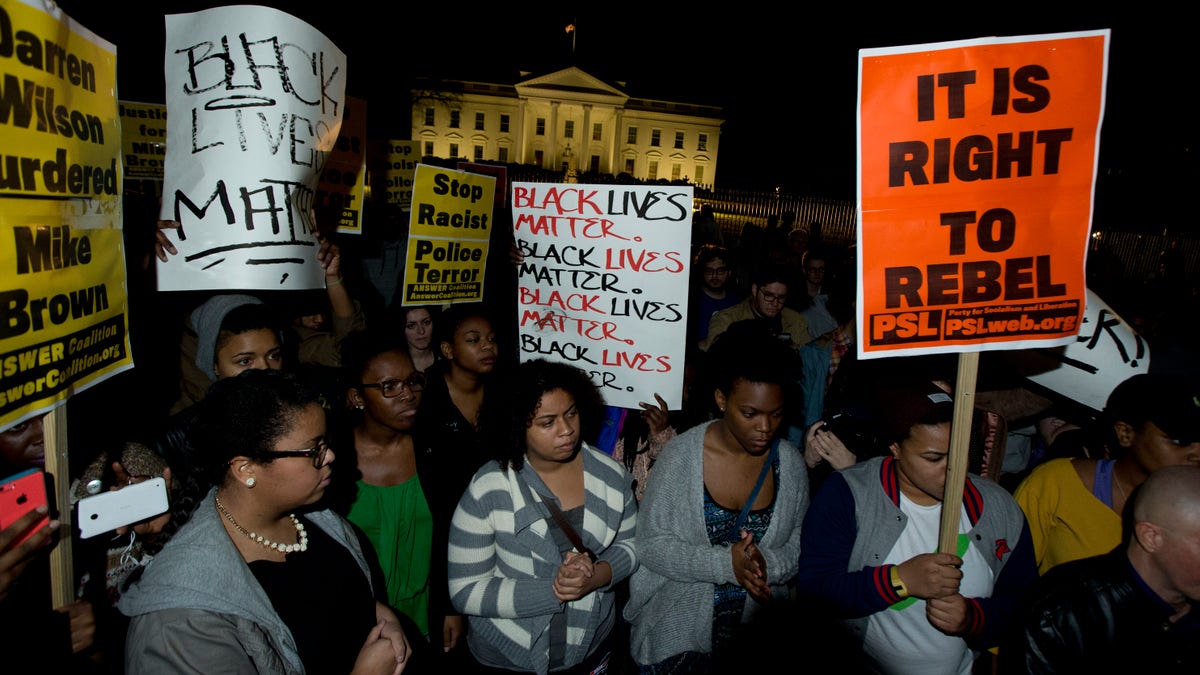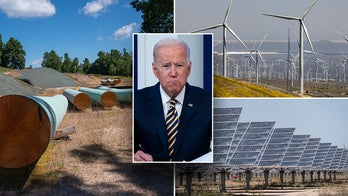
Protestors carry signs and gather in front of the White House in Washington, Tuesday, Nov. 25, 2014, after the Ferguson grand jury decided not to indict police officer Darren Wilson in the shooting death of Michael Brown. (AP Photo/Manuel Balce Ceneta)
The day after a Missouri grand jury declined to indict a white police officer over the shooting of an unarmed black 18-year-old, Michael Brown, whose fatal shooting sparked weeks of sometimes violent protests – predominantly among African-Americans – Latino leaders said they sympathize with the pain and outrage that led to unrest in the city of Ferguson and elsewhere in the nation, but also expressed sadness over the violence that has resulted.
U.S. Rep. Luis Gutiérrez (D-Ill.) said in a Tuesday interview that he was devastated by both the grand jury decision and the violent protests, which he said he watched on television with his wife.
“We had hoped there would be a trial and a full and complete airing of all of the issues surrounding the death of the young Brown,” Gutierrez said. “We were saddened for the family, the parents – we’re parents too.”
“But we’re also saddened by the violence, violence has no place,” Gutierrez said. “You need to raise your voice when you see injustice but need to do it in a peaceful, non-violent manner . . . that garners public support.”
In California, where there were also protests that turned violent at times, Latino civil rights groups – while not condoning the violence – said it was a reminder of the sort of experience that all minority communities struggle under.
“As a nation, we mourn the tragedy that has befallen Ferguson, and we lament the grand jury’s decision not to indict police officer Darren Wilson for the senseless death of a young unarmed man,” said Angelica Salas, executive director of the Coalition for Humane Immigrant Rights of Los Angeles (CHIRLA), an immigrant rights organization.
“As immigrants seeking to be part of the American Dream, we painfully realize the dream for other U.S. citizens is also short-handed, outright denied and fraught with injustice. Life, liberty, and justice still needs to be guaranteed for all citizens.”
“We call on all residents of this great nation,” Salas continued, “to use our anger and disillusionment as the fuel that ignites our compassion and support for Brown’s family and our commitment to continue fighting for justice and equality for all, police accountability and stronger communities.”
Latino clergy urged calm.
"The only antidote that will truly alleviate the tension and angst in Ferguson, Missouri, resides in the peace that only Christ can render,” said the Rev. Samuel Rodriguez, president of the National Hispanic Christian Leadership Conference (NHCLC)/Conela. “The prophetic and conciliatory concept of ‘Shalom’ a peace where nothing stands missing or broken, presents the prescription for a community divided by race and fear.”
“We pray for peace,” Rodriguez said. “We plead for reconciliation. We yearn for all parties to recognize that both Michael Brown and officer Darren Wilson represent individuals created in the image of God. We call upon the God that heals to enable truth, love, justice and forgiveness to silence the voices of hatred, division, strife and violence."
After the Ferguson shooting in August, the Associated Press looked at minority representation in police departments around the country, and found that diversity was lacking, although the hiring of black law enforcement officers had increased.
Latino representation in police departments where Hispanics are a large part of the community, however, still was woefully low, the AP found.
In Anaheim, for instance, where the police department is among the least racially balanced in the nation, the police killings of two Latino men in 2012 set off angry protests. While more than half the community is Hispanic, only 23 percent of the sworn police officers are.
"There's a huge gap between community and police," said Theresa Smith, a member of the Anaheim Community Coalition, which aims to improve police oversight. Police shot and killed Smith's son in 2009. "You can't bridge that gap if people don't trust you."
The executive director of Puentes New Orleans, Carolina Hernandez, said her group has been working with local police to bridge the divide between officers and the Latino community. "If you're here to protect and serve," she said, "it's hard to accomplish that when the community automatically doesn't trust you."
Moments after the announcement by St. Louis County's top prosecutor, Bob McCulloch, crowds began pouring into Ferguson streets to protest the decision. Some taunted police, broke windows and set fire to cars. Within a few hours, several large buildings were ablaze, and frequent gunfire was heard. Officers used tear gas to try to disperse some of the gatherings.
Groups that advocate for undocumented immigrants drew parallels between the tensions and lack of trust between minorities and police and the sometimes tenuous relationship between foreign born residents and their local enforcement officers.
“Whether at the border or on our streets, aggressive enforcement has been tearing apart our families and our communities," said Felipe Sousa-Rodriguez, deputy managing director of United We Dream. “We need a justice system that protects us all. Our community remains fearful of those entrusted with serving and protecting us, given that many times in reporting crimes against us, we’re the ones who end up detained or deported.”
“This is bigger than one decision. Black and brown communities will continue coming together to demand change, and to show the country that young people, united, can win positive change for their families and communities.”
The Associated Press contributed to this report.




